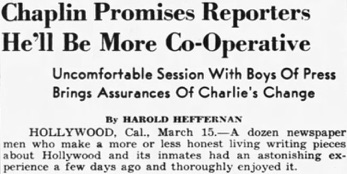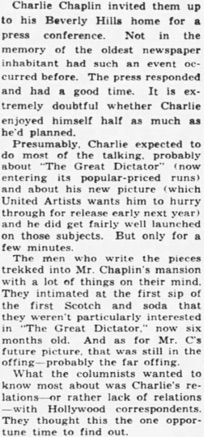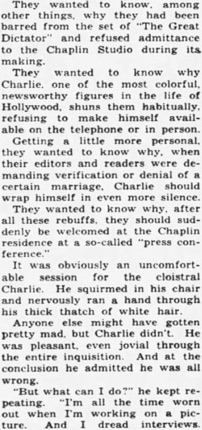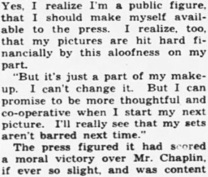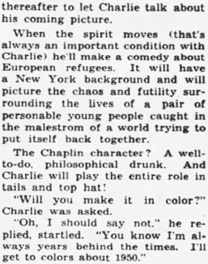The Great Dictator 1939 1940 next previous
The Great Dictator Clippings 296/369
Harold Heffernan, Miami News, Miami, Florida, March 15, 1941.
Harold Heffernan
(...) Photo, St. Louis Post-Dispatch, St. Louis,
Missouri, July 11, 1941
„Scored a moral victory over Mr. Chaplin“
Editorial content. „Chaplin Promises Reporters
He‘ll Be More Co-Operative
Uncomfortable Session With Boys Of Press Brings
Assurances Of Charlie‘s Change
By HAROLD HEFFERNAN
HOLLYWOOD, Cal., March 15. – A dozen newspaper men
who make a more or less honest living writing pieces
about Hollywood and its inmates had an astonishing experience
a few days ago and thoroughly enjoyed it.
Charlie Chaplin invited up to his Beverly Hills home for
a press conference. Not in the memory of the oldest
newspaper inhabitant had such an event occurred before.
The press responded and had a good time. It is
extremely doubtful whether Charlie enjoyed himself half as much
as he‘d planned.
Presumably, Charlie expected to do most of the talking,
probably about The Great Dictator (now entering its
popular-priced runs) and about his new picture (which United
Artists wants him to hurry through for release early next
year) and he did et fairly well launched on those subjects. But
only for a few minutes.
The men who write the pieces trekked into Mr. Chaplin‘s
mansion with a lot of things on their mind. They
intimated at the first sip of the first Scotch and soda that they
weren‘t particularly interested in The Great Dictator,
now six months old. And as for Mr. C‘s future picture, that was
still in the offing – probably the far offing.
What the columnists wanted to know most about was
Charlie‘s relations – or rather lack of relations – with
Hollywood correspondents. They thought this the one opportune
time to find out.
They wanted to know, among other things, why they had
been barred from the set of The Great Dictator and
refused admittance to the Chaplin Studio during its making.
They wanted to know why Charlie, one of the
most colorful, newsworthy figures in the life of Hollywood,
shuns them habitually, refusing to make himself
available on the telephone or in person.
Getting a little more personal, they wanted to know why,
when their editors and readers were demanding
verification or denial of a certain marriage, Charlie should
wrap himself in even more silence.
They wanted to know why, after all these rebuffs,
they should suddenly be welcomed at the Chaplin residence
at a so-called ,press conference.‘
It was obviously an uncomfortable session for the
cloistral Charlie. He squirmed in his chair and nervously ran
a hand through his thick thatch of white hair.
Anyone else might have gotten pretty mad, but Charlie
didn‘t. He was pleasant, even jovial through the
entire inquisition. And at the conclusion he admitted he was
all wrong.
,But what can I do?‘ he kept repeating. ,I‘m all the time
worn out when I‘m working on a picture. And I dread
interviews. Yes, I realize I‘m a public figure, that I should
make myself available to the press. I realize, too,
that my pictures are hit hard financially by this aloofness
on my part.
,But it‘s just a part of my makeup. I can‘t change it. But
I can promise to be more thoughtful and co-operative
when I start my next picture. I‘ll really see that my sets aren‘t
barred next time.‘
The press figured it had scored a moral victory over
Mr. Chaplin, if ever so slight, and was content thereafter to let
Charlie talk about his coming picture.
When the spirit moves (that‘s always an important
condition with Charlie) he‘ll make a comedy about European
refugees. It will have a New York background
and will picture the chaos and futility surrounding the lives
of a pair of personable young people caught in the
malestrom of a world trying to put itself back together.
The Chaplin character? A well-to-do, philosophical drunk.
And Charlie will play the entire role in tails and top hat!
,Will you make it in color?‘ Charlie was asked.
,Oh, I should say not,‘ he replied, startled. ,You know I‘m
always years behind the times. I‘ll get to colors about 1950.“
Redaktioneller Inhalt
The Great Dictator 1939 1940 next previous

